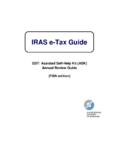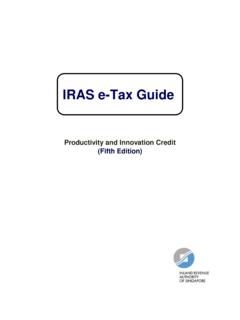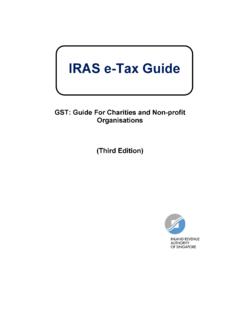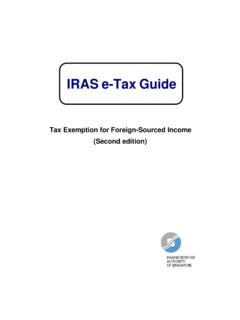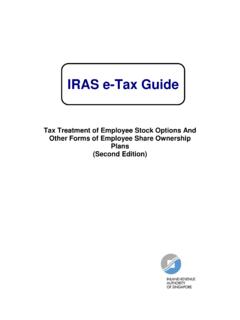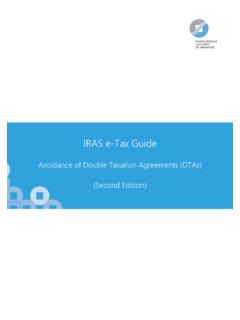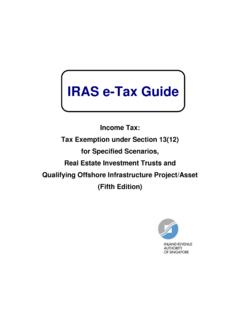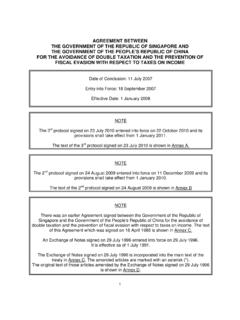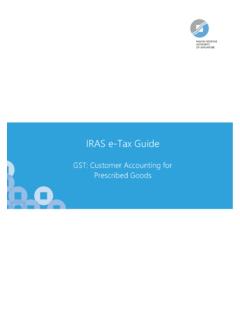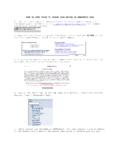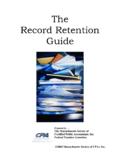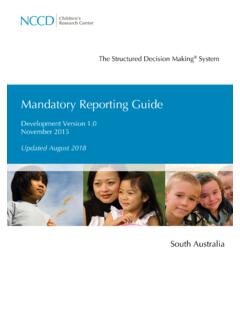Transcription of IRAS e-Tax Guide
1 record Keeping Guide for GST-Registered Businesses (Fifth Edition) IRAS e-Tax Guide Published by Inland Revenue Authority of Singapore Published on 3 Jan 2019 First edition on 31 May 2010 Disclaimers: IRAS shall not be responsible or held accountable in any way for any damage, loss or expense whatsoever, arising directly or indirectly from any inaccuracy or incompleteness in the Contents of this e-Tax Guide , or errors or omissions in the transmission of the Contents. IRAS shall not be responsible or held accountable in any way for any decision made or action taken by you or any third party in reliance upon the Contents in this e-Tax Guide .
2 This information aims to provide a better general understanding of taxpayers tax obligations and is not intended to comprehensively address all possible tax issues that may arise. While every effort has been made to ensure that this information is consistent with existing law and practice, should there be any changes, IRAS reserves the right to vary its position accordingly. Inland Revenue Authority of Singapore All rights reserved. No part of this publication may be reproduced or transmitted in any form or by any means, including photocopying and recording without the written permission of the copyright holder, application for which should be addressed to the publisher. Such written permission must also be obtained before any part of this publication is stored in a retrieval system of any nature.
3 Table of Contents Page 1. Aim .. 1 2. At a glance .. 1 3. Background .. 1 4. record Keeping Requirements .. 4 5. Details on different types of records .. 7 6. Tips for record keeping .. 15 7. For more information .. 15 8. Updates and amendments .. 16 9. Appendices .. 17 record Keeping Guide for GST-Registered Businesses 1 1. Aim This e-Tax Guide provides the mandatory record keeping requirements1 for businesses registered for Goods and Services Tax ( GST ) in order to comply with Singapore Tax laws. 2. At a glance This Guide is designed to help GST-registered businesses2 prepare and keep records for Income Tax and GST purposes. 3. Background What types of records do businesses need to keep? The types of records businesses need to keep include: a) Source documents that substantiate all business transactions receipts, invoices, vouchers, other relevant documents issued or received from customers / suppliers, bank statements; b) Accounting ledgers, schedules and journals documenting a business assets and liabilities, income and expenses, profits and losses; and c) Any other written evidence of transactions connected with your business.
4 Why keep records? Good record keeping practices are an important part of doing business. Having good record keeping practices can benefit you in the following ways: a) Make better business decisions; b) Be aware of the financial status of their business ( profit or loss position, whether there is internal fraud or theft (if any); and c) Reduce the cost and effort required to file Income Tax and GST returns, and to reply to IRAS queries (if any). It is the responsibility of business owners and company directors to ensure that proper records are kept. You are expected to put in place a record keeping system to ensure that your Income Tax and GST declarations are duly supported with the required documents.
5 1 This e-Tax Guide has been updated to give greater clarity on record keeping requirements and has also subsumed the following e-Tax Guides: - Keeping Records of Business and Transactions in Microforms; - Keeping Machine-Sensible Records and Electronic Invoicing; and - Keeping of Records in Imaging Systems. 2 Businesses , for the purpose of GST, would include sole-proprietorships, general partnerships, limited liability partnerships, limited partnerships, companies, clubs, associations, management corporations or organisations, non-profit organisations, statutory boards and government bodies. 1 How to keep your records? Manual Records a) Manual record keeping is the recording of your business transactions in a physical form.
6 Examples of manual records are record books, receipts and physical invoices. Business transactions must be supported by source documents such as invoices / receipts from your suppliers, and carbon / duplicate copies of invoices / receipts issued to your customers; b) When you keep your records manually, you must make sure that you keep all your records in a legible and well-organised manner. For example, you should retain photocopies of receipts printed on thermal paper in case the originals fade over time. Electronic Records a) Records can be kept electronically using a computer and / or accounting software. This includes using Microsoft Office applications, off-the-shelf accounting software, customised accounting software and image systems3.
7 Physical copies of source documents need not be kept to substantiate your business transactions for tax purposes if the source documents are kept electronically. b) Businesses do not need to seek approval from IRAS to keep their records in an electronic format for tax purposes. However, businesses should ensure that proper internal controls are put in place to ensure the integrity, completeness, accuracy, availability and reliability of the electronic records, including all transactions executed electronically, where applicable4. c) Advantages of keeping records electronically include: i. Quick, efficient and accurate recording of your business transactions (including details such as customer particulars, payment details, and stock / inventory details); ii.
8 Getting timely updates on how your business is performing so that you can plan ahead and forecast your business needs; 3 Image system refers to any computer system that is capable of capturing, storing and retrieving images or generating image system. Imaged records are business records that are kept in an image system. 4 To ensure proper storage of imaged business records, businesses may take reference from the criteria set out in the First Schedule of the Evidence (Computer Output) Regulations, criteria in relation to document capture, image storage and management, image output, computer applications, physical and environmental security, system and application security.
9 A business may also wish to have part or all of its image system certified as an approved process under the First Schedule of the Evidence (Computer Output) Regulations, if this meets its business needs. 2 iii. Convenient keeping of invoices and ease of generating summaries and reports to fulfil your tax and other business reporting obligations; iv. Less storage space required as compared to manual records; v. Facilitating the backing up of records and allowing backup records to be kept in a safer place in the event of theft or natural disasters. Backing up your records will benefit your business. In the event that your business records are missing or destroyed, it is your responsibility to make use of other relevant documents to reproduce your records.
10 Accounting software is a helpful tool that may assist businesses to improve their record keeping practices and tax compliance. Businesses may refer to the Accounting Software Register ( ASR )5 for a list of accounting software that is compliant with IRAS technical requirements. Manual Records versus Electronic Records a) A manual record keeping system may be sufficient for businesses with small volumes of transactions. However, as your business expands and the number of transactions increases, a manual record keeping system may no longer be able to meet your needs. For instance, a retailer with many outlets would find an electronic record keeping system more useful in managing its business records; b) Using an electronic record keeping system will incur lower manpower costs as you would not have to manually track each and every business transaction.
